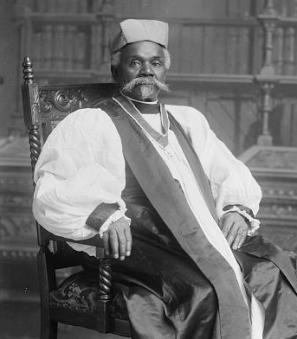The Laurel Pop Festival: Maryland's Woodstock-Before-Woodstock
In the summer of 1969, thousands of young people gathered together to attend a festival showcasing many of the greatest musicians of their generation. Huddled around each other in the mud, these counterculture youth engaged in a capstone event to the rebellious and liberating 1960s. This event, of course, was Maryland’s Laurel Pop Festival.
Indeed, a little over a month before Woodstock, the Laurel Race Course featured its own lineup of impressive and influential rock and pop acts over two nights, July 11 and 12. Though certainly overshadowed by the ever-famous Woodstock and ever-infamous Altamont, the Laurel Pop Festival was special in its own right.
Featuring a lineup that the Laurel Leader called a “who’s who” in pop music,[1] the two-day event was the invention of local promoters Elzie Street and James Scott, who teamed up with George Wein, founder of the famed Newport Folk Festival. The Laurel concert was originally intended as a companion to Wein’s Laurel Jazz Festival, which had run annually since 1967. Shifting tastes and audience expectations made a new focus on pop music to be a profitable move, as Street explained:
“My belief is this: the day has passed when you can have a strictly jazz festival. You have to have a music festival and mix jazz and pop or soul and jazz. We only have so many jazz fans … I’m with today’s music. If that’s what they want, that’s what we’ll give them.”[2]
In the leadup to the show, several papers, including The Evening Star, Washington Post, and Baltimore Sun ran numerous advertisements. Tickets were available at local retail outlets (a foreign concept today), including Sears and Montgomery Ward among others. Running between $4.75 and $10 (roughly $32-$66 in 2017), the profits exceeded the $55,000 cost of the performers by roughly $30,000.[3]
The first night of the festival on July 11 was an unqualified success, featuring giants like Johnny Winter, Jethro Tull, and finally, Led Zeppelin. The atmosphere was one of halcyon hippie bliss, as The Sun described:
“Down through the aisles they streamed with incense and scented candles burning all the young, young beautiful faces. Fireworks occasionally lit the sky; somebody was blowing bubbles which floated gently through the air, illuminated by the stage lights”[4]
While the scene at the race track included many of the expected sights and “vibes” of the prototypical 60’s rock festival, certain factors set it apart. Its relatively small size and obscurity contributed to its uniqueness. Far from being “half a million strong” as Joni Mitchell famously described Woodstock, Laurel reached a peak of 15,000 attendees. In addition, several of the groups performing were largely still in the “trying to make it” phase of their careers – Jethro Tull and Led Zeppelin had only released a single studio album.
The recording sessions of Led Zeppelin’s critically acclaimed Led Zeppelin II were ongoing during the time of the festival, meaning that attendees had the opportunity to hear some of the group’s most famous songs (such as “What is and What Should Never Be” or “The Lemon Song”) before most of the world knew they existed.
Attendee and festival documenter Bruce Remer recalled the experience:
“We were facing the grandstand, the stage was facing out towards the woods over here. They did “The Lemon Song”, and when [Robert Plant] is screaming “squeeze my lemon”, it started echoing off the trees, and he was playing with it. I distinctly remember that, and it was incredible hearing him play with the echo.”[5]
Though the festival had gotten off to a great start, the second night had its share of problems. The 12th of July was a rainy evening. As a result, the night’s first act, The Guess Who, was delayed by two hours, a setback that would cause further problems as the night drew on. Yet despite this, the audience was largely in good spirits and in greater numbers than the night before.[6]
A notable but forgotten moment in rock history, the Jeff Beck Group played one of its final concerts (if not final) with its original lineup featuring Rod Stewart on the Laurel Pop Festival’s second night. Though scheduled to play Woodstock in August, they never did.[7]
Another highlight was Frank Zappa’s Mothers of Invention, who played a characteristically absurd set that made “ribald mockery of all things serious.”[8] Still, Zappa’s technical proficiency shone through, with one journalist remarking “he had a look on his face as if trying to say ‘Look at me, I’m in good full control of the music; not one note got out of hand.'”[9]
By the time Zappa’s ten-man “freakshow” left the stage, it was already 1:10 a.m. with two more acts to go. Pushed back by the rain, the festival’s later set-times brought on unforeseen problems. Now beginning to resemble Altamont more than Woodstock, in the cold wee-hours of the morning, concert goers began burning their wooden folding chairs into large bonfires to keep warm.
Following a lengthy set-up time and an announcement saying “the management has asked you please not to burn the chairs,” Sly & the Family Stone took the stage around 2 a.m.[10] With fires still burning in the race-course infield, the soul-funk group performed its hit “I Want to Take You Higher” among other songs, but their set was cut short. Prince George’s County police and venue management had had enough of the raucous music echoing through Laurel (which was by all journalists’ accounts, far too loud), as well as the continued bonfires. The group was abruptly directed off-stage, as one attendee purportedly heaved a chair at the stage-hands.[11] The festival’s final act, The Savoy Brown Blues Band, never went on.
Whether or not the end of the festival was truly as chaotic as some sources claimed is unclear. In any case, concert promoter Elzie Street did his best to downplay the uproar:
“There were only about 40 or 50 chairs burned. The way it appeared on TV, it looked like chaos. When we looked at the books, it was maybe $100 worth of damage … These kids will go as far as you let ‘em, but if you tell ‘em to stop, they will”[12]
Many journalists were similarly sympathetic, even if they didn’t truly understand or identify with the concert goers. As one reporter put it:
“A few years ago, this audience was so feared that a rock concert looked like a meeting of the Patrolmen’s Benevolent association. Now, some concert promoters have discovered that a good many kids are far more peaceful folk than their parents. And more tolerant too.” [13]
Another remarked upon overhearing “this generation will either be the best or worst ever.”[14]
When it came to the music, a young Carl Bernstein (who would later play a crucial role in reporting Watergate) was not so impressed. Though complementary of Zappa, Al Kooper, and Johnny Winter, he was not moved by the rest as he wrote in the Post:
“Jethro Tull, Jeff Beck, Ten Years After and Led Zeppelin all were widely acclaimed by the audience and have best-selling albums, facts that make it unpleasant to contemplate where rock is going.”[15]
In retrospect, it’s safe to say that Bernstein’s pessimism was unfounded as many of the groups that graced the Laurel stage enjoyed tremendous success. However, with Woodstock happening only a month after, the Laurel Pop Festival was soon buried in its shadow. The damages and roudiness put off mangement, and the plan of annual festivals was tossed aside and never revisited. Still, it was a special night in rock music that the D.C area should be proud to own.
Footnotes
- ^ Leonard, Kevin. “Laurel Pop Festival was Warm-Up Act for Woodstock in July 1969.” Baltimore Sun. December 12, 2012.
- ^ Dilts, James. “Area Festival Working on Groovy Things: Jazz, Pop, Soul.” Baltimore Sun. July 27, 1969.
- ^ Ibid.
- ^ Arent, Earl. “Bonfires Curtail Pop Festival at Laurel.” Baltimore Sun. July 14, 1969.
- ^ Leonard, Kevin. “Lost Laurel Ep. 6: Date Night”. Youtube video, 22:33. Posted June 6, 2015. https://www.youtube.com/watch?v=MJBY3Df07Ik
- ^ Arent, Earl. “Bonfires Curtail Pop Festival at Laurel.” Baltimore Sun. July 14, 1969.
- ^ Leonard, Kevin. “Laurel Pop Festival was Warm-Up Act for Woodstock in July 1969.” Baltimore Sun. December 12, 2012.
- ^ Arent, Earl. “Bonfires Curtail Pop Festival at Laurel.” Baltimore Sun. July 14, 1969.
- ^ Larson, Drew. “Laurel Pop Fete Rocks Along After Two-Hour Rain Delay.” Evening Star. July 14, 1969.
- ^ Arent, Earl. “Bonfires Curtail Pop Festival at Laurel.” Baltimore Sun. July 14, 1969.
- ^ Dilts, James. “Area Festival Working on Groovy Things: Jazz, Pop, Soul.” Baltimore Sun. July 27, 1969.
- ^ Ibid.
- ^ Mintz, Donald. “Miscellaneous Musings.” Evening Star. July 27, 1969.
- ^ House, Toni. “Pop Festival Loud and Flashy.” Evening Star. July 12, 1969.
- ^ Bernstein, Carl. “Pop and Burn.” Washington Post. July 14 1969.


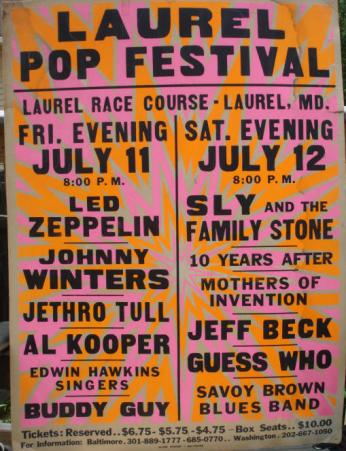
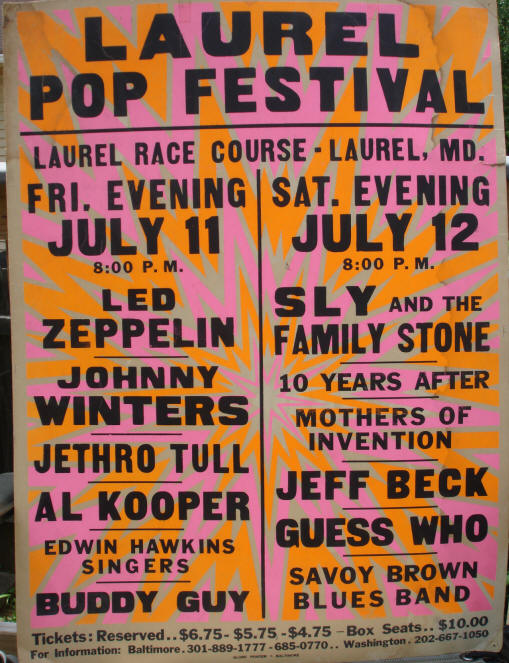
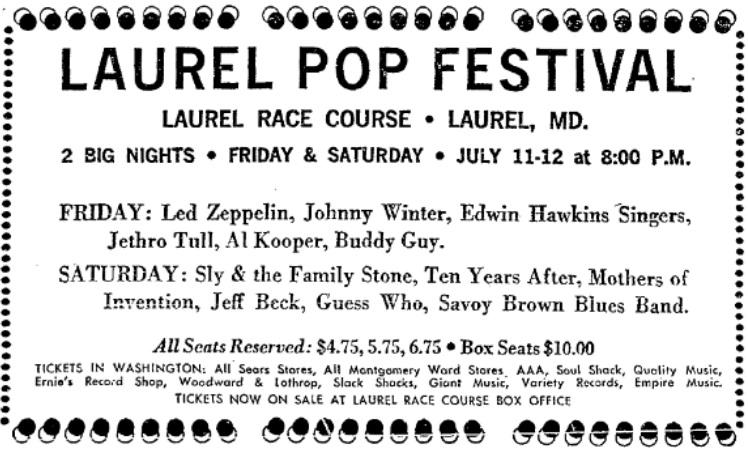

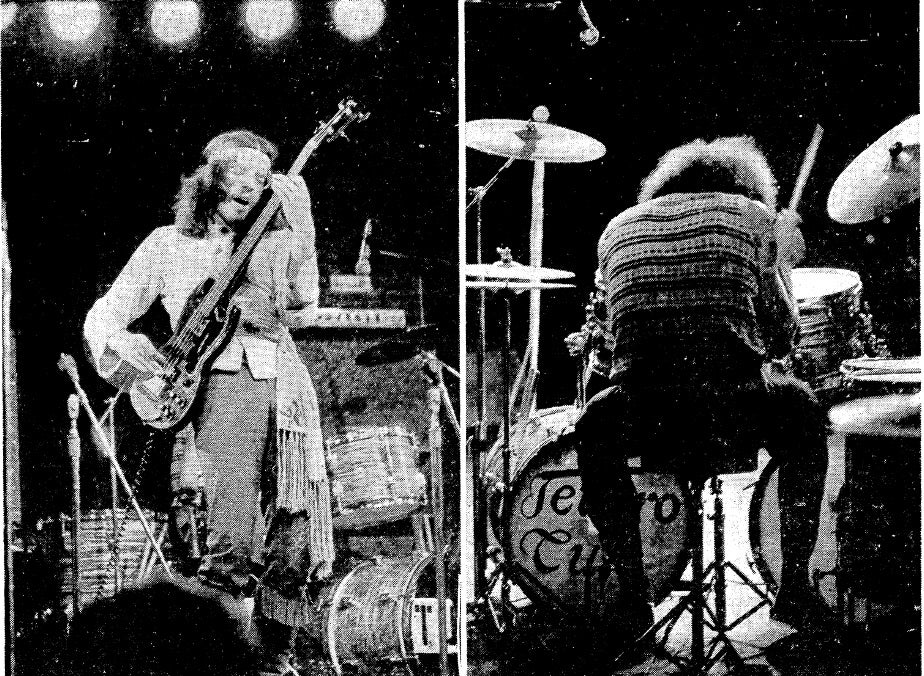
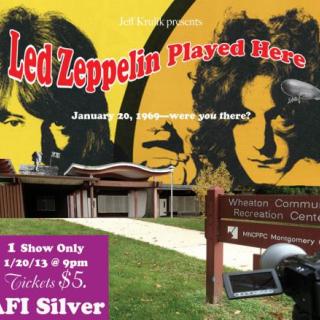
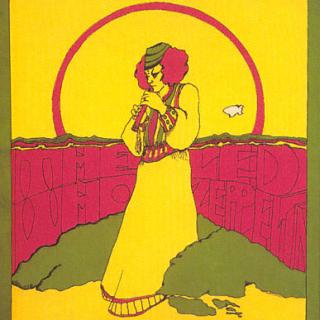
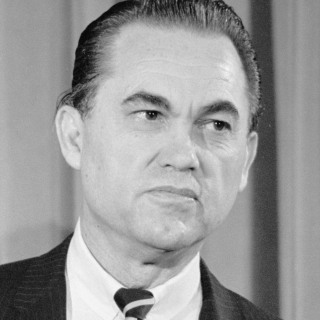
![Sketch of the mythical fuan by Pearson Scott Foresman. [Source: Wikipedia]](/sites/default/files/styles/crop_320x320/public/2023-10/Goatman_Wikipedia_Faun_2_%28PSF%29.png?h=64a074ff&itok=C9Qh-PE1)











